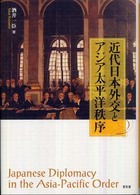- ホーム
- > 洋書
- > 英文書
- > Politics / International Relations
Full Description
Is politics strictly a means to an end—something that serves only the interests of individuals and the various associations of civil society such as families and charities? Or is a society's political common good an end in itself, an essential component of full human flourishing? Responding to recent influential arguments for the instrumentality of the political common good, Matthew D. Wright's A Vindication of Politics addresses a lacuna in natural law political theory by foregrounding the significance of political culture. Rather than an activity defined by law and government, politics emerges in this account as a cultural enterprise that connects generations and ennobles our common life.
The instrumentalist argument, in Wright's view, does not give a plausible account of, among other things, the value of patriotism—of the way Americans revere the Founders, for instance, or love the Declaration of Independence, or idolize Abraham Lincoln. Such political affections cannot be explained by an instrumental common good. Loyalty to one's country is not like a commitment to a telephone company. As nasty as politics can be, we hope for more from it than the quid pro quo of a business transaction. To arrive at an adequate theoretical account of why that is, Wright brings historical theory from Aristotle to Burke into conversation with contemporary theorists from John Finnis to Amy Gutmann. In A Vindication of Politics he develops a case for the intrinsic value of politics in a way that underwrites a healthy patriotism—and strongly suggests that the political common good is a critical part of what it means to be fully human.
The book offers new insight into the nature of the political common good and human sociability as well as their importance for making sense of the fundamental questions of American constitutional identity, principles, and aspirations.
Contents
Acknowledgments
Introduction
1. Critical Assessment of Finnis's Instrumentality Thesis
2. Familial Good
3. Formal Characteristics of Political Association
4. Civic Friendship: Paradox and Possibility
5. Political Culture as an Intrinsic Good
Conclusion
Notes
Bibliography
Index








